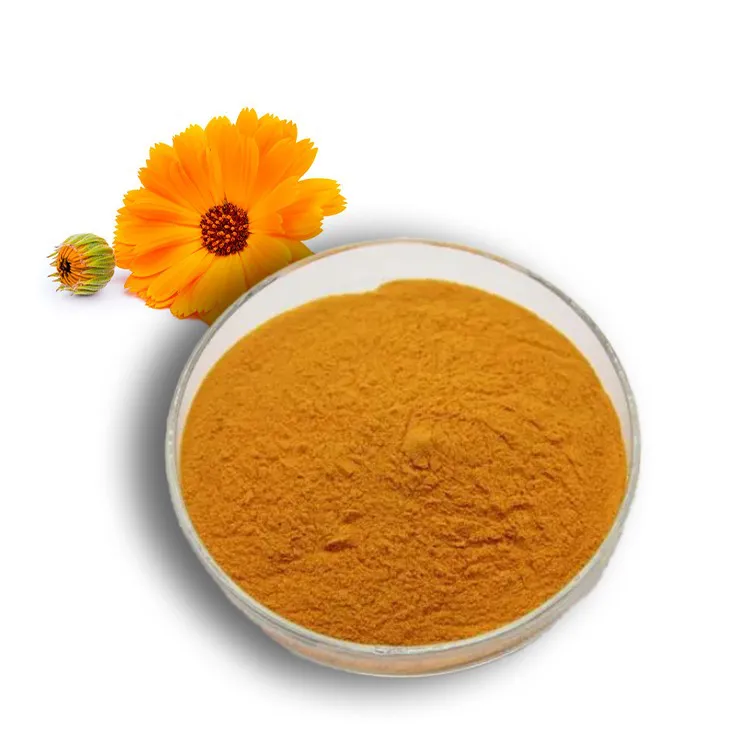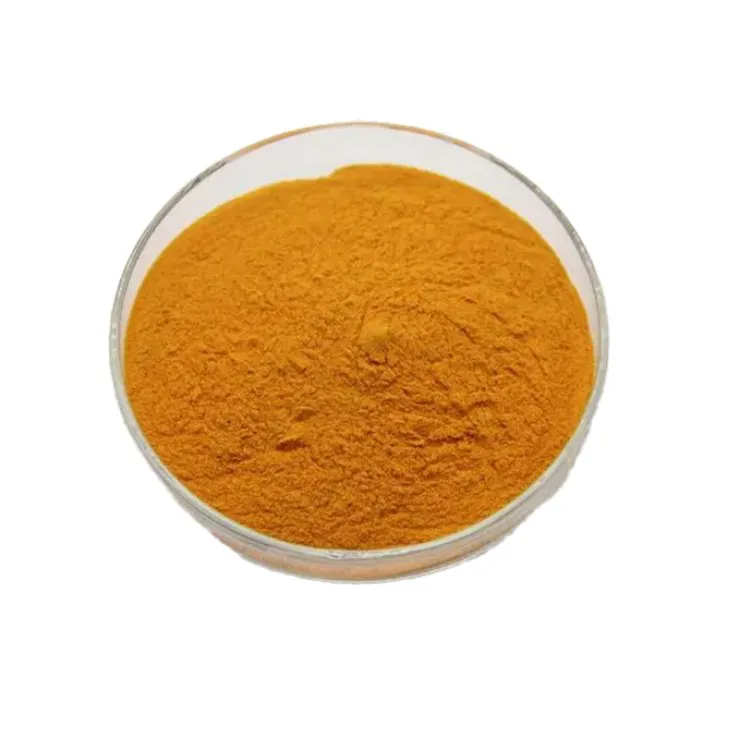- 0086-571-85302990
- sales@greenskybio.com
Does Calendula extract have benefits for diabetes? Are these all safe and suitable for diabetic patients?
2024-11-13

1. Introduction
Diabetes is a chronic metabolic disorder that affects millions of people worldwide. It is characterized by high blood glucose levels due to either insufficient insulin production or ineffective insulin utilization. Management of diabetes often involves lifestyle modifications, such as diet and exercise, as well as medications. In recent years, there has been an increasing interest in exploring the potential benefits of natural products, including plant extracts, in the treatment and management of diabetes. Calendula officinalis, commonly known as calendula or pot marigold, is a plant that has been used in traditional medicine for various purposes. This article aims to investigate whether Calendula officinalis extract is advantageous for diabetes and its safety for diabetic patients.

2. Chemical Composition of Calendula officinalis Extract
Calendula officinalis contains a wide range of bioactive compounds. Some of the major components include:
- Flavonoids: These are polyphenolic compounds that have antioxidant properties. Flavonoids in calendula, such as Quercetin and kaempferol, may play a role in reducing oxidative stress, which is often associated with diabetes and its complications.
- Terpenoids: They are known for their anti - inflammatory properties. Calendula terpenoids may contribute to modulating the inflammatory response in the body, which is also important in diabetes management as chronic inflammation is linked to insulin resistance.
- Carotenoids: Such as lutein and zeaxanthin. These compounds may have beneficial effects on eye health, which is of particular concern in diabetic patients as they are at a higher risk of developing diabetic retinopathy.

3. Potential Benefits for Diabetes
3.1 Antioxidant Activity
Oxidative stress is a significant factor in the development and progression of diabetes. High blood glucose levels can lead to the overproduction of reactive oxygen species (ROS), which can damage cells, proteins, and DNA. The flavonoids and other antioxidant compounds in Calendula officinalis extract can scavenge ROS, reducing oxidative damage. By decreasing oxidative stress, it may potentially help in improving insulin sensitivity. For example, in vitro studies have shown that Calendula Extracts can inhibit lipid peroxidation, a process associated with oxidative stress, in cell models related to diabetes.
3.2 Anti - inflammatory Effects
Chronic inflammation is closely related to insulin resistance, a key feature of type 2 diabetes. Calendula's terpenoids and other anti - inflammatory components can modulate the immune response and reduce inflammation. In animal studies, treatment with Calendula Extract has been shown to decrease markers of inflammation in tissues related to glucose metabolism. This anti - inflammatory action may contribute to better glycemic control by improving insulin signaling and reducing insulin resistance.
3.3 Hypoglycemic Effects
There is some evidence suggesting that Calendula officinalis extract may have hypoglycemic effects. In some pre - clinical studies, Calendula Extracts have been shown to lower blood glucose levels. However, the exact mechanisms underlying this effect are not fully understood. It may be related to its effects on insulin secretion, insulin sensitivity, or both. For instance, it could potentially stimulate pancreatic beta - cells to secrete more insulin or enhance the action of insulin on target cells.
3.4 Effects on Diabetic Complications
3.4.1 Diabetic Nephropathy: Diabetic nephropathy is a common complication of diabetes that affects the kidneys. The antioxidant and anti - inflammatory properties of calendula extract may protect the kidneys from damage caused by high blood glucose and inflammation. Some studies have suggested that calendula may help in reducing proteinuria, a sign of kidney damage in diabetic patients.
3.4.2 Diabetic Retinopathy: As mentioned earlier, calendula contains carotenoids that are beneficial for eye health. In addition, its antioxidant and anti - inflammatory effects may also play a role in preventing or slowing down the progression of diabetic retinopathy, which is a leading cause of blindness in diabetic patients.
3.4.3 Diabetic Neuropathy: Calendula's potential to reduce inflammation and oxidative stress may also be beneficial for diabetic neuropathy. By protecting nerve cells from damage, it may help in alleviating symptoms such as pain, numbness, and tingling in the extremities of diabetic patients.

4. Safety of Calendula officinalis Extract for Diabetic Patients
4.1 General Safety
Calendula officinalis is generally considered safe when used topically or in moderate amounts orally. However, like any herbal product, it may cause allergic reactions in some individuals. People with known allergies to plants in the Asteraceae family (which calendula belongs to) are more likely to experience allergic reactions. Symptoms of an allergic reaction may include skin rashes, itching, swelling, and in severe cases, difficulty breathing.
4.2 Interaction with Medications
Diabetic patients often take medications to control their blood glucose levels. There is a concern about potential interactions between Calendula officinalis extract and diabetes medications. Some studies suggest that calendula may enhance the hypoglycemic effects of certain medications. This could potentially lead to dangerously low blood glucose levels (hypoglycemia). For example, if a diabetic patient is taking metformin and also using calendula extract, there may be an increased risk of hypoglycemia. Therefore, it is crucial for diabetic patients to consult their healthcare providers before using calendula extract, especially if they are on any diabetes medications.
4.3 Quality Control and Standardization
The safety and effectiveness of Calendula officinalis extract can also be affected by the quality of the product. There is a lack of strict standardization in the production of herbal extracts, including calendula. Different products may vary in their chemical composition and potency. Poor - quality extracts may contain contaminants or have inconsistent levels of active ingredients, which could pose risks to diabetic patients. To ensure safety, it is important to choose products from reliable sources that follow good manufacturing practices.

5. Conclusion
Calendula officinalis extract shows potential benefits for diabetes in terms of its antioxidant, anti - inflammatory, hypoglycemic effects, and its possible impact on diabetic complications. However, the safety of calendula extract for diabetic patients is a complex issue. While it is generally safe, there are concerns regarding allergic reactions, interactions with medications, and the lack of standardization in product quality. Diabetic patients should not self - medicate with calendula extract but rather consult their healthcare providers. Future research is needed to further clarify the mechanisms of action of calendula extract in diabetes, to determine the optimal dosage, and to ensure its safety and effectiveness in the management of diabetes.
FAQ:
Question 1: What are the potential benefits of Calendula officinalis extract for diabetes?
Calendula officinalis extract may have several potential benefits for diabetes. Some studies suggest that it may possess antioxidant properties. Oxidative stress is often increased in diabetic patients, and antioxidants can help combat the damage caused by free radicals. It may also have anti - inflammatory effects. Chronic inflammation is associated with diabetes, and by reducing inflammation, it could potentially contribute to better glycemic control. Additionally, there is some evidence indicating that it might play a role in improving blood lipid profiles, which is often disrupted in diabetes.
Question 2: How does Calendula officinalis extract interact with diabetes medications?
Currently, there is limited research on the specific interactions between Calendula officinalis extract and diabetes medications. However, in general, it is important for diabetic patients to be cautious when using any herbal supplement alongside their medications. Some herbal products can either enhance or interfere with the effectiveness of medications. For example, it could potentially increase or decrease the absorption or metabolism of drugs used to control blood sugar levels. Diabetic patients should always consult their healthcare provider before starting to use Calendula officinalis extract to avoid any potential adverse interactions.
Question 3: Is Calendula officinalis extract safe for long - term use in diabetic patients?
While Calendula officinalis is generally considered safe for most people when used in moderation, the long - term safety in diabetic patients specifically has not been fully established. Some individuals may experience allergic reactions to calendula. Also, since diabetic patients often have underlying health conditions and may be taking multiple medications, long - term use of the extract could potentially lead to unforeseen health issues. More research is needed to determine the long - term safety profile in this patient population.
Question 4: Can Calendula officinalis extract help in preventing diabetes - related complications?
There is some indication that it might help prevent diabetes - related complications. As mentioned before, its antioxidant and anti - inflammatory properties could potentially play a role. For example, in preventing diabetic neuropathy, the anti - inflammatory effect may reduce nerve damage caused by inflammation. In terms of diabetic retinopathy, the antioxidant properties could potentially protect the eyes from oxidative damage. However, these are still mostly theoretical benefits and more clinical studies are required to confirm its effectiveness in preventing such complications.
Question 5: How is Calendula officinalis extract typically administered for potential diabetes benefits?
Calendula officinalis extract can be administered in various forms. It is available as a tincture, which is a concentrated liquid extract usually taken orally. It can also be found in capsule form. Some people may use calendula - based creams topically, although the evidence for topical application in relation to diabetes benefits is scarce. The appropriate dosage depends on various factors such as the form of the extract, the individual's health status, and the intended use. However, it is crucial to follow the recommended dosages provided by a healthcare provider or the product manufacturer.
Related literature
- The Role of Herbal Supplements in Diabetes Management: A Review of Calendula officinalis"
- "Antioxidant and Anti - inflammatory Properties of Calendula officinalis Extract in the Context of Diabetes"
- "Calendula officinalis and Diabetes: Safety and Efficacy Considerations"
- ▶ Hesperidin
- ▶ Citrus Bioflavonoids
- ▶ Plant Extract
- ▶ lycopene
- ▶ Diosmin
- ▶ Grape seed extract
- ▶ Sea buckthorn Juice Powder
- ▶ Fruit Juice Powder
- ▶ Hops Extract
- ▶ Artichoke Extract
- ▶ Mushroom extract
- ▶ Astaxanthin
- ▶ Green Tea Extract
- ▶ Curcumin
- ▶ Horse Chestnut Extract
- ▶ Other Product
- ▶ Boswellia Serrata Extract
- ▶ Resveratrol
- ▶ Marigold Extract
- ▶ Grape Leaf Extract
- ▶ New Product
- ▶ Aminolevulinic acid
- ▶ Cranberry Extract
- ▶ Red Yeast Rice
- ▶ Red Wine Extract
-
Longan Extract
2024-11-13
-
Senna Leaf Extract
2024-11-13
-
Beta Carotene
2024-11-13
-
Beetroot Powder
2024-11-13
-
White Willow Bark Extract
2024-11-13
-
Medicinal Marshmallow Extract
2024-11-13
-
Tamarind extract powder
2024-11-13
-
Mango flavored powder
2024-11-13
-
Cat Claw Extract
2024-11-13
-
Yellow Pine Extract
2024-11-13





















